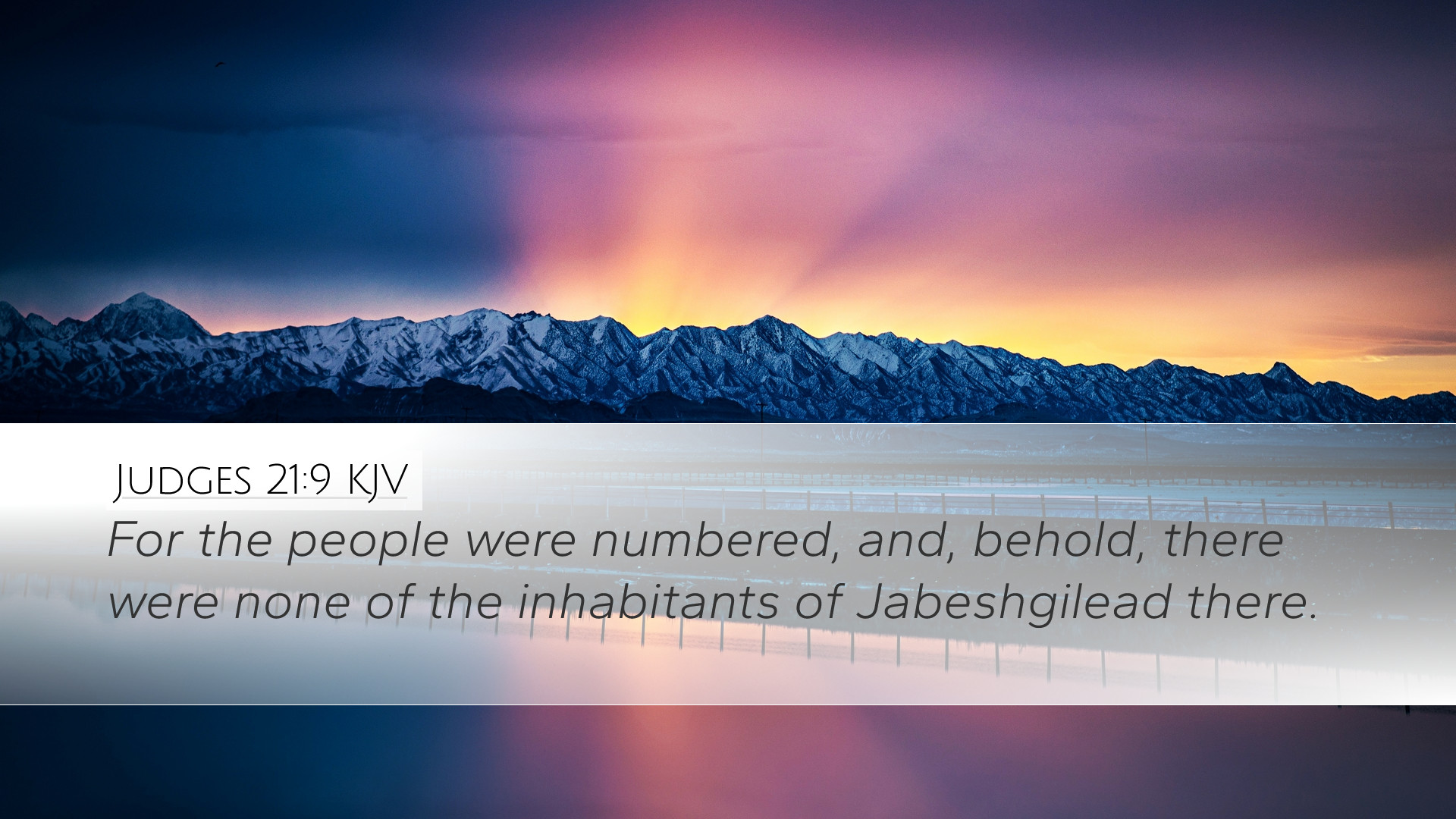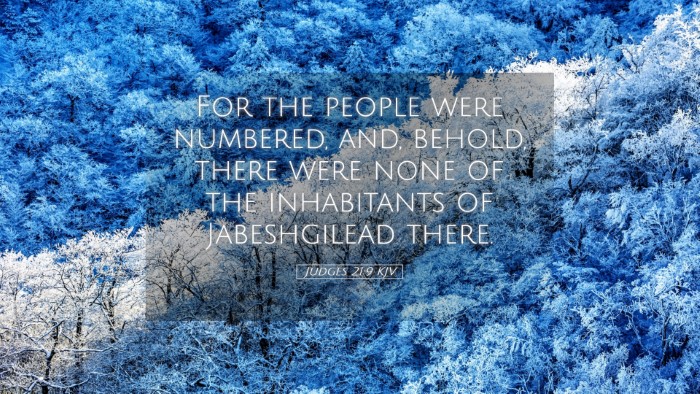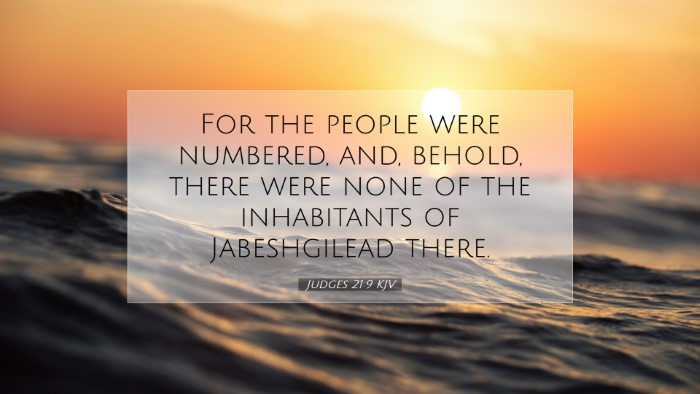Commentary on Judges 21:9
Introduction
Judges 21:9 states, "For the people were numbered, and, behold, there were none of the inhabitants of Jabeshgilead there." This verse is situated at a crucial point in the narrative of the Book of Judges, reflecting on the dire consequences of Israel's civil strife and the desperate need for restoration and unity among the tribes. Here we delve into insights from Matthew Henry, Albert Barnes, and Adam Clarke to examine the theological implications and historical context of this verse.
Historical Context
The events leading to Judges 21:9 arise from a tragic civil war between the Israelites, which was instigated by the atrocity in Gibeah. The Levite's concubine was brutally abused, leading to a call for justice that spiraled into conflict. The destruction of Gibeah was swiftly executed, but the tribes soon realized that they had nearly decimated one of their own, leading to a recognition of the need for survivors in the context of maintaining national unity.
The Significance of Jabesh-Gilead
Jabesh-Gilead is presented as a notable location for several reasons. It had not contributed to the war against Benjamin, which made the absence of its inhabitants now a point of concern. Matthew Henry observes that the people of Jabesh-Gilead were considered “peaceable” and thus they were not among those who participated in the war, highlighting their loyalty to peace over conflict.
Theological Reflections
The verse encapsulates a significant theological lesson about community responsibility. Albert Barnes comments on the implications of absence and accountability, illustrating that every tribe and individual has a role within the wider covenant community.
Divine Order and Justice
The gathering of Israel's tribes for judgment underscores the principle of collective responsibility. As emphasized by Adam Clarke, the divine rationale behind gatherings is to serve justice and restore order. The absence of Jabesh-Gilead suggests a breakdown in unity and failure to uphold their covenant responsibilities, leaving a void during a time of great trial.
Unity in Diversity
The Psalmist's view of unity in diversity finds an echoed truth here. The necessity for all tribes to come together, as emphasized in these narratives, showcases that God's people, despite differing circumstances, must collaborate for mutual preservation. This is particularly relevant for today's church and its diversity of thought and practice.
Application for the Church Today
The implications of Judges 21:9 reverberate through the corridors of modern church life. Here are several areas for reflection and application:
-
Community Engagement: Just as Jabesh-Gilead’s silence was noted, today’s churches must confess and recognize their participation (or lack thereof) in local and global issues, demonstrating a commitment to justice and active engagement.
-
Restoration vs. Destruction: The trajectory of Judges emphasizes the need for restoration over destruction. The church is called to be a reconciling presence in the world, stepping into the gaps left by inaction.
-
Covenant Responsibility: Every member is integral to the church’s mission and health, akin to how each tribe contributed to Israel’s identity. Every believer is urged to consider their role and responsibility within the body of Christ.
-
Inter-Tribal Digression: The fragmented state of the church should lament believers prioritizing denominational divides over unity in Christ—a reminder to seek ‘one body’.
-
Prayer for Unity: Drawing on the dire context of unity among the tribes of Israel, pastors and leaders are called to prayer, seeking the Spirit’s guidance for uniting the church across diverse backgrounds towards a common mission.
-
Vigilance Against Silence: The church is to guard against being quiet in the face of evil, realizing that silence can imply complicity—a challenge to speak out against injustice.
-
The Role of Leadership: Leaders, similar to the tribes’ leaders in Judges, have the responsibility to foster a culture committed to unity and accountability among the church's members.
-
Building Bridges: Just as the tribes reconvened to restore what was lost, church leaders should prioritize efforts to build bridges between differing factions within their congregations and communities.
-
Engagement with God’s Word: A steadfast commitment to Scripture assures believers of God's covenantal promises and offers guidance in resolving disputes, thereby preventing the moral decay seen in the Book of Judges.
-
Collective Prayer: Hebrew tradition was rich with communal prayer; thus, today’s believers are encouraged to seek God together, lifting their voices as one body for the needs of their communities.
-
Learning from History: History must be viewed as a teacher for the present. The church today should heed lessons from its own history of division and strive toward God’s call for unity.
-
Sharing in Suffering: In understanding loss and the need for reconciliation, churches are called to bear one another’s burdens, promoting a sense of kinship that echoes the text's deeper implications.
-
Continued Reflection: This text calls for continuous reflection on what it means to be a body in Christ that is active, engaged, and thoughtful in the contemporary landscape of faith.
-
Encouragement to Action: Finally, Judges 21:9 serves as an impetus for action; the church must mobilize its members out of apathy towards active participation in God’s redemptive work in the world.
Conclusion
Judges 21:9 reflects the struggle for unity within the Israelite tribes amid chaos and conflict, serving as a cautionary tale that warns against silence in the face of injustice. The insights from Matthew Henry, Albert Barnes, and Adam Clarke reveal profound theological truths and applications for the modern church. Namely, the necessity of communal responsibility, the imperative of action in the pursuit of justice, and the vital role of each believer within the body of Christ resonate loudly for pastors, students, and theologians alike as they contemplate their discipleship in today’s fractured world.


